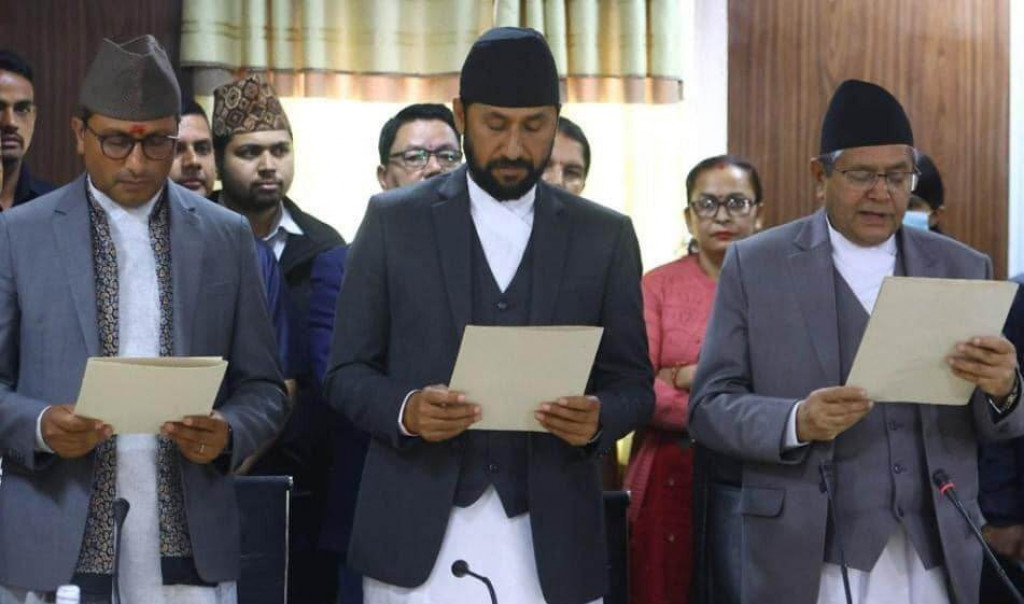Crisis Looms Over Ravi Lamichhane After Swarnim Wagle's Return from China: Is Leadership Transfer Imminent?

Ravi Lamichhane's political journey has been controversial. Once celebrated as one of Nepal’s most influential media personalities, Lamichhane garnered public trust by raising his voice against corruption and political malpractices. However, his recent connection with China has triggered a new crisis. International democratic powers have begun to view this relationship with suspicion, putting Lamichhane's political future in jeopardy. Alongside this growing discontent, Shalikram Pudasaini’s final message has also been revisited in a new context.
Shalikram Pudasaini's Final Message: A Warning
Five years ago, journalist Shalikram Pudasaini, in his last video, made serious accusations against Ravi Lamichhane. He said, “Ravi Lamichhane, one day you will face your karma. There is no one more corrupt than you in this country. You’ve threatened, extorted, and taken bribes worth millions. You once told me you would kill me if I spoke! Ravi, one day that money will burn you, mark my words!”
This video caused an immediate sensation across the country, and public outrage against Lamichhane intensified. Following Pudasaini’s death, Lamichhane faced a deep investigation and legal battles but managed to escape conviction. However, his current ties with China and allegations of misuse of cooperative funds have revived the warnings from Pudasaini's last message.
The Discontent Stemming from China Relations
In early 2024, Sun Haiyan, the Deputy Minister of the Communist Party of China, visited Nepal and met with Rastriya Swatantra Party (RSP) President Ravi Lamichhane, praising his political success. This meeting hinted at formal recognition of Lamichhane’s party by China. While China endorsed Lamichhane’s leadership, India and Western democratic powers began viewing him with suspicion.
In this context, a high-level RSP delegation, led by Dr. Swarnim Wagle, visited China to strengthen relations between the two parties. However, due to Nepal’s growing political developments, this visit was cut short after only two days. Many speculate that Lamichhane, sensing international democratic powers’ discontent, immediately called the delegation back.
International Relations and Political Crisis
Lamichhane’s association with China has created new tensions in Nepal's international relations. India and the U.S. have long viewed Nepal as a strategic partner, and both powers have been cautiously observing China’s growing influence in the region. Lamichhane's increasing closeness with China has heightened their concerns. As a result of this discontent, Indian and Western powers have refrained from any formal communication with his party, further weakening his political standing.
If Lamichhane continues his relationship with China, he could face further international backlash, particularly from India and the West, who see his alignment with China as a challenge to Nepal's balanced foreign policy. This situation has raised serious questions about his leadership, increasing the likelihood that he will face diplomatic isolation.
Dr. Swarnim Wagle: A Possible Leadership Change
Lamichhane’s abrupt recall of his party’s delegation from China suggests that he may be reconsidering his ties with the country. Some political analysts have interpreted this as a sign of his awareness of international discontent. Meanwhile, Lamichhane’s leadership within his party is increasingly under strain. Allegations from Shalikram Pudasaini, accusations of fund misuse, and other legal troubles have placed him in a difficult position.
Recent political developments indicate a growing possibility that Lamichhane may hand over leadership of the party to Dr. Swarnim Wagle. Wagle, a respected economist and political figure, currently serves as the RSP’s Vice President and Head of International Relations. Should the legal allegations against Lamichhane be proven, Wagle is seen as the likely candidate to assume permanent leadership of the party.
Wagle led the delegation to China and is regarded positively within the party for his leadership skills. If Lamichhane is politically incapacitated in the future, Wagle could not only take over party leadership but also potentially lead a future government, should the RSP become part of a governing coalition.
Conclusion: Ravi Lamichhane's Political Future in Crisis
Lamichhane’s ties with China have plunged his political future into deep uncertainty. Revisiting Shalikram Pudasaini's final message in light of recent events, it is clear that Lamichhane is facing mounting legal and political pressures. Meanwhile, discontent from international democratic powers has added to the challenges he faces. The pressing question now is whether Lamichhane will manage to retain his leadership or hand over control of the party to Dr. Swarnim Wagle.
Ultimately, Lamichhane’s political future remains unstable, and the decisions he makes in the near future will not only shape his party’s trajectory but also have long-term impacts on Nepal’s diplomatic relations.





![From Kathmandu to the World: How Excel Students Are Winning Big [Admission Open]](https://nepalaaja.com/index.php/img/70194/medium/excel-college-info-eng-nep-2342.jpg)


